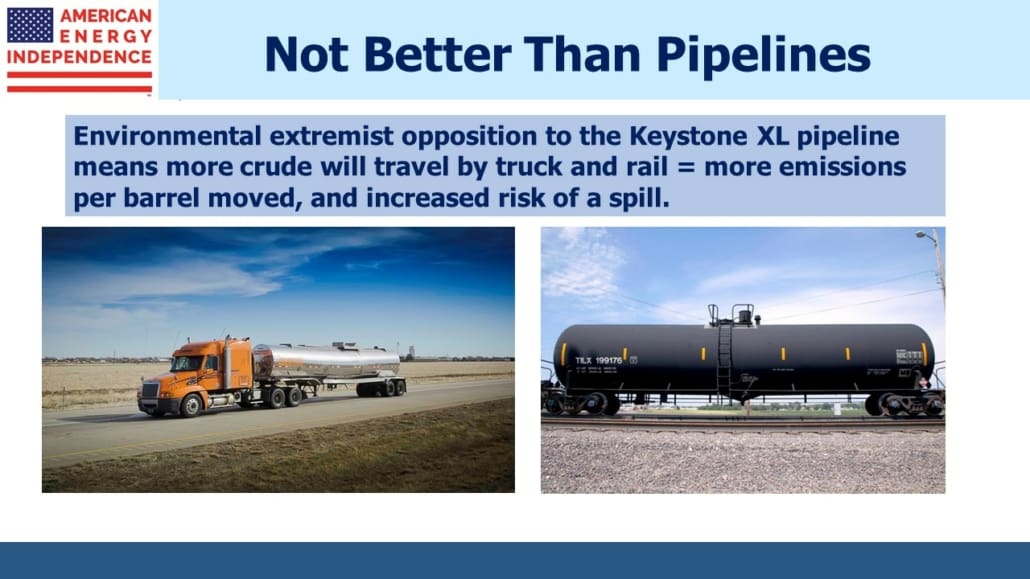Biden’s Keystone Cancellation Draws $15BN Lawsuit
The Keystone XL pipeline extension (KXL) became a political football years ago. Canada has long struggled to transport its crude oil from Alberta to markets overseas. Three years ago Kinder Morgan (KMI) found themselves embroiled in an inter-provincial dispute, when British Columbia refused to allow added capacity to the TransMountain Pipeline (TMX) that links Edmonton, Alberta with Vancouver and the Pacific. Having concluded the project had become too political, KMI fortuitously sold TMX to the Canadian federal government just weeks before a court issued a ruling that added further substantial delay (see Canada’s Failing Energy Strategy).
The Keystone Pipeline System runs from Alberta to Cushing, OK and on to the Gulf of Mexico. In 2008 planning was started for KXL, which was needed to add 830K barrels per day of additional capacity, albeit following a different route which would have allowed it to pick up oil in North Dakota too.
KXL’s size made canceling it a goal of environmental extremists. Because it was to cross the US-Canada border, the State Department was involved in its approval. Obama imposed delays for several years, but in 2017 newly-elected President Trump approved it. TRP brought in Alberta as a partner, so as to share risk with the government entity best positioned to benefit. Court challenges caused further delays, but in March 2020 TC Energy (TRP), the owner, announced plans to proceed with construction.
In January on his first day in office, newly-elected President Joe Biden issued an executive order canceling the permit for KXL. Last week TRP announced they’re suing the US for $15BN under the United States-Mexico-Canada Trade Agreement (USMCA) that replaced NAFTA.

It was a dumb move full of theatrics to play to progressive Democrats. Most of the oil that KXL was going to transport will still get to market, albeit by rail and truck which are (1) more expensive, (2) worse for the environment, and (3) not as safe as pipelines. KXL opponents presumably expect that the higher transportation cost will result in less crude being produced. That may be true, but given the second and third considerations listed above we may have higher emissions and more spills than if KXL had been built.
While environmental extremists hailed Biden’s decision, they may come to hope that TRP prevails in court. Capital investments whose timeline extends beyond a single presidential term need certainty that permits issued under one administration can’t be revoked under a later one. Just as an individual can’t simply change his mind over a prior legal commitment, neither can a country.
TRP’s lawsuit revolves around whether the US was permitted to change its mind about KXL. The concept that a permit lawfully obtained under a prior administration is nonetheless subject to subsequent revocation is not free. If allowed to stand, the capricious flexibility so allowed would inject uncertainty into a wide range of capital projects. Investors would need to consider the possible impact of an election, which would increase the required IRR to justify an investment. Corporations would become more deeply involved in elections in order to protect their investments.
Moreover, it’s entirely possible that a new Republican administration in 2025 could rescind Biden executive orders that were intended to support investment in infrastructure to support renewables. If TRP loses its lawsuit, capital commitments in support of the energy transition that rely on today’s executive orders will ultimately deliver more expensive energy than otherwise – if they even reach completion.
The US has adopted an arrogant stance to its northern ally on this issue, something easily done for a superpower. KXL and oil exports were always going to be more important to Canada, and Americans famously care little for their northern neighbors’ feelings anyway.
But there’s a lot more at stake than a lost pipeline investment in TRP’s lawsuit, which if they were to be awarded the full $15BN would amount to over $100 per US household. If the US prevails, required IRRs will rise on many projects, including renewables that could become political flashpoints. NIMBY opposition is already growing to the onshore placement of solar farms, windmills and the high voltage power lines necessary to move power from rural areas to population centers.
It may turn out that seeing TRP prevail in court will be more beneficial to the goals of the Sierra Club, flawed though they are, than uncertainty over the longevity of future presidential permits. If so, maybe their members will pay towards the $15BN they’ll have cost the rest of us.
Disclosure: We are invested in all the components of the American Energy Independence Index via the ETF that ...
more


